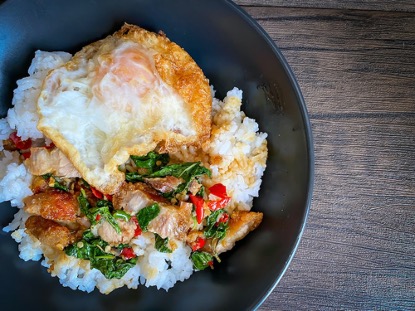by Kitty Foo

Many of us are familiar with the popular meal option at coffee shops and food courts here in Malaysia – Nasi Campur or mixed rice. The excitement of checking out the spread of dishes, and then selecting what we want to go with a serving of plain rice is something that many of us look forward to. The spread is usually the same – from delicious meats to succulent seafoods, delicate tofu to various crunchy root and leafy vegetables. We are in awe of the variety, a little overwhelmed, and to a large extent confused and regretful when we end up with a plate piled high with much more than we can finish.
Despite the wide array of choices, I always end up picking the same old food items. Occasionally I take the risk and try something I have never had. Often this decision to try something new makes me regretful, wishing I had stuck to my usual familiar favourites.
What makes us stick to the familiar? Why are we adverse to the unfamiliar? What makes it so difficult for us to be open to diversity?
Food often triggers the memories that we grew up with. I remember my mum’s cooking with warmth and affection; the meals she cooked that made me smile and look forward to rushing home after school. There have been foods that I totally took an instant dislike to like cold soba, and foods like soya beans and coffee that just upset my system and make me feel uncomfortable. AS you can imagine, I stay clear of these food items.
How we choose our Nasi Campur dishes bears some similarity to how we respond to the people we meet. We stick to the familiar, influenced by past memories. We are drawn to people who share the same values and beliefs as we do, just like the way I am drawn to the same fried chicken and green vegetables each time I select my Nasi Campur.
I don’t wander too far off from the types of people I choose to hang out with. When I am with people who are seemingly `different’, I naturally start to judge and find reasons for incompatibility. This in turn starts to develop into a barrier between myself and them.
Just like with my experience with food, when an unpleasant experience occurs with a person, it leaves a mark on me and I subconsciously conclude that they are different and I prefer to have nothing to do with them.
Then there are moments, although rare, when our tastebuds start to change. I become more open and willing to try something out of my comfort zone, when something I used to dislike becomes less unpleasant. Slowly, I am able to accept the cold soba which I abhorred at one point.
In our daily lives, when we feel conflict and resistance in relationships, take it a bite at a time. Pause, see it from the other’s perspective, have a drink of water, and consider that while it may not be your cup of tea, it is a different view. Not good, not bad, just different. Perhaps I’ll choose to eat sambal squid with bitter gourd the next time I’m at my favourite Nasi Campur stall.